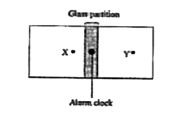Suppose a stick is struck against a frying pan in vacuum. Will the frying pan vibrate? Will we be able to hear the sound? Explain.
To solve the question, we need to analyze two parts: whether the frying pan will vibrate when struck by a stick in a vacuum, and whether we will be able to hear the sound produced by that vibration.
1. Understanding Vibration:
- When a stick strikes a frying pan, it exerts a force on the frying pan. This force causes the frying pan to vibrate.
- Therefore, the answer to the first part of the question is Yes, the frying pan will vibrate.
2. Understanding Sound Transmission:
- Sound is produced by vibrations and requires a medium (such as air, water, or solid materials) to travel through.
- In a vacuum, there are no particles to transmit sound waves.
3. Conclusion on Hearing Sound:
- Since the frying pan vibrates due to the impact of the stick, it produces sound waves. However, because these sound waves require a medium to travel and there is no medium in a vacuum, the sound cannot be transmitted.
- Therefore, the answer to the second part of the question is No, we will not be able to hear the sound.
Final Answer:
- The frying pan will vibrate when struck by the stick, but we will not be able to hear the sound because sound requires a medium to travel, and there is no medium in a vacuum.
- When a stick strikes a frying pan, it exerts a force on the frying pan. This force causes the frying pan to vibrate.
- Therefore, the answer to the first part of the question is Yes, the frying pan will vibrate.
- Sound is produced by vibrations and requires a medium (such as air, water, or solid materials) to travel through.
- In a vacuum, there are no particles to transmit sound waves.
- Since the frying pan vibrates due to the impact of the stick, it produces sound waves. However, because these sound waves require a medium to travel and there is no medium in a vacuum, the sound cannot be transmitted.
- Therefore, the answer to the second part of the question is No, we will not be able to hear the sound.
- The frying pan will vibrate when struck by the stick, but we will not be able to hear the sound because sound requires a medium to travel, and there is no medium in a vacuum.
Topper's Solved these Questions
- BOOK - NCERT EXEMPLARCHAPTER - SOUNDEXERCISE - LONG ANSWER QUESTIONS5videos
SOUND
- BOOK - NCERT EXEMPLARCHAPTER - SOUNDEXERCISE - VERY SHORT ANSWER QUESTIONS6videos
SOUND
- BOOK - NCERT EXEMPLARCHAPTER - SOME NATURAL PHENOMENAEXERCISE - LONG ANSWER QUESTIONS5videos
SOME NATURAL PHENOMENA
- BOOK - NCERT EXEMPLARCHAPTER - STARS AND SOLAR SYSTEMEXERCISE - LONG ANSWER QUESTIONS7videos
STARS AND SOLAR SYSTEM
Similar Questions
Knowledge Check
- Question 1 - Select One
Teflon is used for "non-stick coating in utensils like frying pans because it is a material that offers
Avery large frictionBvery little frictionCno friction at allDnone of these - Question 2 - Select One
Suppose you and your friend are on the Moon. Will you be able to hear any sound produced by your friend ?
AYes, but it will depend upon the distance between me and my friendBNo, because there is no atmosphere on the moonCYes, sound waves can travel anywhereDCannot be determined - Question 3 - Select One
When cooking oil is heated in a frying pan, the oil moves around in the pan more easily when it is hot. The main reason for this is that with rise in temperature, there is a decrease in
AdensityBsurface tensionCviscosityDangle of contact
There is a hollow glass partition in a room. It divides the room in two compartments. Two brothers X and Y are sitting in each compartment. An alarm clock, which is placed inside the glass partition, is producing sound, as shown in the given figure. Both brothers are able to hear the sound. All the air from within the glass partition is removed with the help of a vacuum pump.

After evacuating the partition completely,View SolutionWhy does cooking oil catch fire if a frying pan is kept on the burning stove for a long time?
View SolutionSuppose you hear music being played from a trumpet that is across the room from you. Compressions and rarefactions from the sound wave each your ear, and you interpret these vibrations as sound. Were the air particles that are vibrating near your ear carried across the room by the sound wave? How do you know?
View SolutionNon - sticking frying pans are coated with teflon which is polymer of
View SolutionThe polymer used in making handles of cookers and frying pans is
View Solution

